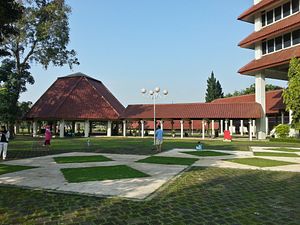China’s trade and investments in Indonesia have grown and expanded exponentially since Xi Jinping introduced the Belt and Road Initiative (BRI). In 2017, Beijing’s trade with the region reached $58.8 billion, a 18 percent increase from 2016. At the same time, while previously China was not among Indonesia’s top five sources of foreign direct investment (FDI), last year it became the third highest investor with $2.3 billion covering 1,562 projects. Such growing figures are accompanied by around 1,000 Chinese companies and 25,000 Chinese workers present in the archipelago.
While this phenomenon has been widely reported, it has been relatively ignored that China’s growing economic foothold has also been accompanied by expanded educational reach. In 2017, for example, China and Indonesia inked an agreement to strengthen their educational partnership. This was the third education partnership signed between the two countries in the post-BRI era after finalizing an agreement on scholarships in 2015 and mutual recognition in academic higher education qualification in 2016.
It is important to note that educational partnership between Beijing and Indonesia started as early as 2000, particularly in nonformal Chinese language training. However, as Chinese economic footholds expand, interest in learning Chinese language has been growing as well among Indonesians.
As a result, various Chinese language centers have been established in the archipelago. Moreover, despite facing various issues and frictions, China has also established Confucius Institutes in the country under the mediation of the Indonesian Coordinating Board for Mandarin Language Education (BKPBM, Badan Koordinasi Pendidikan Bahasa Mandarin). Universitas Hasanuddin in Makassar was among the earliest to establish such an institute. And with Chinese economic activities growing in the country, Confucius Institutes have also been established elsewhere, such as Universitas Kristen Maranatha in Bandung, Universitas Al-Azhar Indonesia in Jakarta, Tanjungpura University, Universitas Negeri Surabaya, and Universitas Muhammadiyah Malang. Besides promoting and teaching Chinese language, these institutes also conduct exchanges and activities to promote Chinese culture.
In recent years, China has also strengthened its formal education partnership with Indonesia. Student and teacher exchanges have been increasingly carried out with an aim to encourage these students and teachers to learn about each other’s language and culture.
In addition, university-to-university (U2U) cooperation between Indonesia and China is also growing. Here again there is a precedent; in the 1990s Universitas Indonesia cooperated with Peking University to compile and produce the Bahasa Indonesia-Mandarin dictionary. In 2015 Beijing gave education funding totaling 500,000 renminbi ($74,000) to the university. Other Chinese universities have also began partnering with counterparts in Indonesia, such as Beijing University with Universitas Indonesia, Tsinghua University with Institut Teknologi Bandung, and some Chinese universities with Universitas Negeri Yogyakarta.
Scientific cooperation is also on the rise. For instance, the two countries have initiated a number of joint laboratories, including on Biotechnology and High Temperature Gas-cooled Reactor (HTGR), the Indonesia China Transfer Technology Center (ICTTC), and Scientific Exchange Programs.
In the past few years, China has also increasingly been strengthening relations with nonstate partners and organizations. In September last year, for example, China’s State Administration for Religious Affairs made public their intention to pursue a partnership with Muhammadiyah, one of Indonesia’s largest Islamic organizations, on education and religious affairs.
Meanwhile, although the precise data is difficult to obtain, the number of Indonesian students being offered opportunities to study in China is growing, making China one of the top destinations for Indonesians to pursue their education. The Chinese Embassy in Indonesia reported in 2017 that the number has reached 14,000. While the majority of these students study Chinese language and literature, an increasing number of those also entering other fields, including medicine, industry and technology.
The growing number of Indonesian students was perhaps the outcome of China’s active efforts to attract Indonesians to study in China. The China Education Exhibition (CEE), for example, has been held 16 times to date, under the cooperation between the Chinese Service Center Exchange (CSCSE) and Indonesia’s Ministry of Education and Culture.
Furthermore, the government in Beijing is also offering scholarships to Indonesians. While this effort dates back to the beginning of China-Indonesia ties, it has increased since the introduction of the BRI. In 2017, for instance, 215 scholarships were granted to Indonesian students, 11 times greater than 2015 numbers.
While it is clear that China’s educational reach is expanding alongside its economic foothold in Indonesia, it remains unclear how the former can help legitimize the latter. In the past few years, anti-Chinese sentiment has been on the rise in the archipelago, with scaremongering about a flood of Chinese workers taking local jobs as well as a rise in the use of derogatory terms like Asing (foreigners).
Unlike in Africa, where China has used educational platforms to establish legitimacy for its economic activities, the same circumstance has not been seen in the context of China in Indonesia. Nonetheless, this may change in the future. This is particularly because China’s economic footholds in Indonesia are expected to grow and anti-Chinese sentiments to intensify.
Dr. Muhammad Zulfikar Rakhmat is a lecturer at Universitas Islam Indonesia and is a research associate at Jakarta-based Institute for Development of Economics and Finance (INDEF).

































